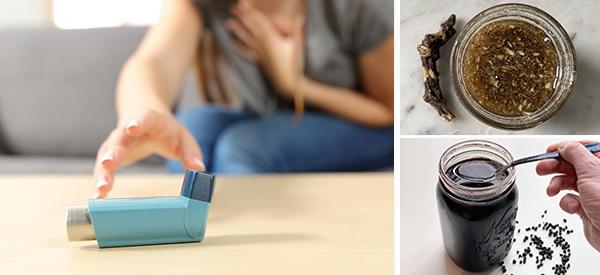
How to Treat an Asthma Attack Naturally When You Don’t Have an Inhaler
If you are one of the more than 25 million Americans who suffer from asthma, you know exactly how scary an asthma attack can be. When you are coughing, wheezing, and struggling just to breathe every second count.
Most asthmatics rely on a rescue inhaler to provide immediate relief but what can you do if you don’t have your inhaler? There are a number of natural herbal remedies for asthma that can help you combat your attacks and help provide immediate relief. There are also a number of herbs that you can take regularly to help lessen the frequency of your asthma attacks and improve your breathing.
Mullein
One of the most effective herbs for asthma is Mullein. Mullein, Verbascum thapsus, has been used for centuries to treat respiratory ailments. Often considered a weed, mullein can easily be found growing wild. It is recognizable by the leaves, which can be quite large and grow in a rosette. They have small hairs on them that make them velvety to touch. In its second year, the produces a single stalk that can reach heights up to two feet. The plant’s yellow flowers grow from the stalk.
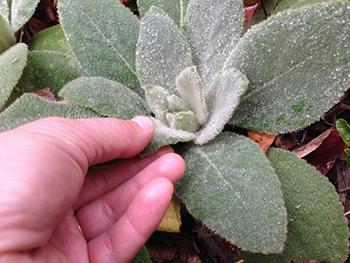
Both the leaves and flowers of the plant can be used medicinally. It is the high concentration of mucilage in Mullein that makes it so effective in treating asthma and other respiratory complaints.
Traditionally, the dry leaves were smoked to provide immediate relief of asthma symptoms. However, you can make a tea or a tincture that is effective for rapid relief, as well.
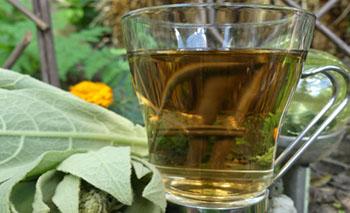
Recipe: Mullein Tea
- 1 tsp dry leaves
- 8 ounces water
- Honey to taste
Steep one teaspoon of mullein leaves in a cup of boiling water.
Allow the tea to cool before you drink it.
You can drink 1-2 cups per day. You should consume it slowly, one tablespoon at a time.
Elderberry Syrup
Elderberry, Sambucus nigra, has been used medicinally since the ancient Greeks. A flowering shrub, elderberry often grows wild along roads and streams. It can reach heights between 10 – 23 feet tall. It has a bumpy, unpleasant-smelling bark that helps make it easy to identify. In May and June, it produces clusters of small yellow-white flowers. In the fall, those flowers ripen into blue-black berries. Elderberry is easy to grow in your garden requiring very little attention. The flowers, berries, inner root, and bark can all be used medicinally.
This versatile plant can be made into tea, juice, syrup, or tincture. Elderberry is known for its immune-boosting effects and its usefulness in treating respiratory conditions. It can be used for immediate relief or taken daily as a preventative measure.
Elderberry syrup can be added to your daily routine to help reduce the frequency of your asthma attacks. The syrup can be made with either fresh or dried elderberries. If you are using elderberries you harvested make certain to remove any leaves and stems. Also, elderberry can be contraindicated with certain asthma medications so be sure to check with your doctor before using elderberry syrup for asthma relief.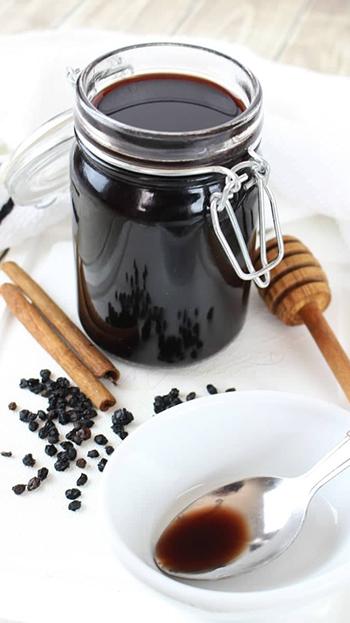
Recipe: Elderberry syrup
- 1 cup fresh elderberries (½ cup dry elderberries)
- 2 ½ cups of water (add additional ½ cup of water if you are using dry berries)
- 1 cup of honey
- Add the elderberries and water to a medium saucepan and bring to a boil.
- Boil for 30 minutes to remove the cyanide compounds of the berries
- Mash the elderberries into the water to release all the juices
- Strain the liquid through a fine sieve or cheesecloth
- Bottle and store in the fridge for up to two months
Take 1 tsp daily as preventative medicine or take up to 3 times a day for acute respiratory problems.
Essential Oil Steam
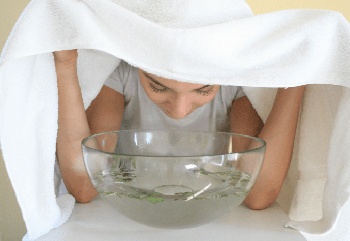 One of the quickest ways to help alleviate an asthma attack is to inhale warm steam. This helps open your lungs and ease your breathing. You can simply inhale warm water, either by standing in a steamy shower or breathing over a pot of boiling water.
One of the quickest ways to help alleviate an asthma attack is to inhale warm steam. This helps open your lungs and ease your breathing. You can simply inhale warm water, either by standing in a steamy shower or breathing over a pot of boiling water.
However, this technique can be enhanced by the addition of certain essential oils. Eucalyptus, and peppermint both are good choices for EOs to help calm your bronchial tubes.
Simply add 5 drops of either EO to a pot of boiling water. Cover your head with a towel and carefully lean over the pot. Slowly inhale the steam for ten minutes. You can repeat every 30 minutes until the symptoms subside.
Related: How to Make an Herbal Steam for Congestion and Allergies
Elecampane
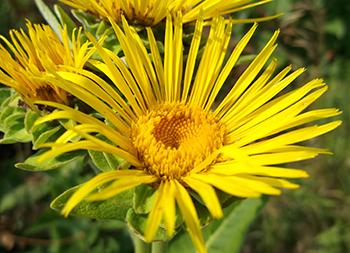 Elecampane, Inula helenium, has many names throughout the world. Often called elf dock or horse-heal, this plant has been used medicinally since ancient times. An expectorant, elecampane is excellent for treating respiratory ailments like asthma.
Elecampane, Inula helenium, has many names throughout the world. Often called elf dock or horse-heal, this plant has been used medicinally since ancient times. An expectorant, elecampane is excellent for treating respiratory ailments like asthma.
A member of the sunflower family, it is a large plant, reaching heights of 3-5 feet that produce large yellow flowers.
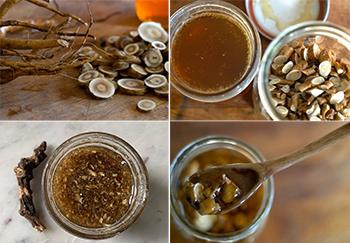
It is the roots of the plant that are used medicinally. Harvest these from plants that are two to three years old.
You can make a tea or tincture with the root or infuse it in honey.
Use elecampane infused honey on its own, or add it to your mullein tea for greater effect.
Recipe: Elecampane Infused honey
- Fill a jar a third of the way with clean, chopped, dry elecampane root
- Cover with raw, natural honey
- Seal the jar with an airtight lid
- Store in a cool dark place
- Flip the jar once a day to keep the honey from sticking
- In two to four weeks strain the roots
- Store the honey in a jar in a cool dark place
While asthma can be scary there are ways to fight it. Knowing natural ways to stop asthma attacks is just the first step. Learning and avoiding triggers, and taking preventive medicines like elderberry syrup can help you get control of your asthma. By following these simple recipes you are on your to better respiratory health. And that should help you breathe more freely.
You may also like:
How to Make Usnea Tincture for Respiratory Support
My Seven Favorite Herbs for the Allergy Season (and Asthma Too!) (Learn More)
Best Herbs for Lungs and Respiratory Support


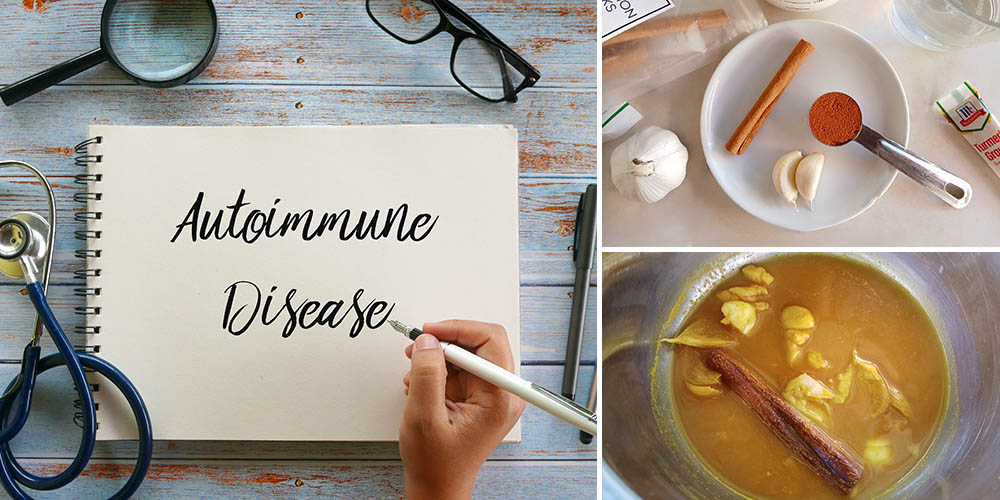
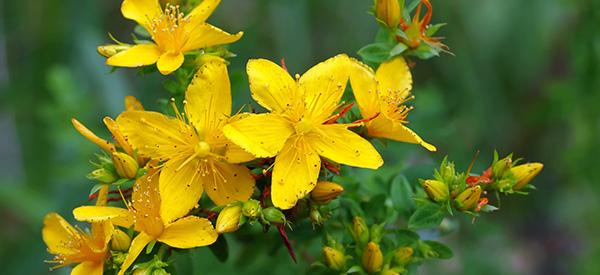
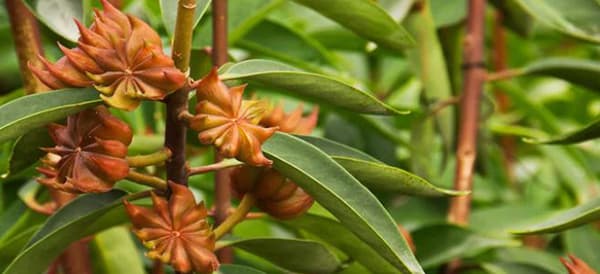
We had such issues with childhood asthma with our children. It occured frequently when they got a respiratory infection. There was a liquid extract of sweet chestnut tree leaves that really helped, but then we discovered MSM or reduced L-Glutathione. They also help with many allergic issues like hay fever.
Hi Geri,
Thank you so much for sharing this experience with us.
I’m glad to hear that the chestnut extract worked.
I wish you the best of health!
Once years ago, two friends were visiting. The one had very bad shellfish allergies. We ordered take out and as he started to eat he could not breathe and like an asthma attack. We had been careful not to order shellfish. We tried his inhaler and it did no good. My other friend who was visiting said she heard black tea very strong could help an allergy attack. We gave him spoonfuls of lipton tea very strong and within 5 minutes he was fine.
Hi Janet,
Thank you for sharing your experience with us.
Never underestimate the power of herbs 🙂
God bless!
Great Knowledge, thank you.
not herbal but the tannic acid apparently in black tea helps to stop an allergic reaction.
What a breath of fresh air! Thank you for all your work. I can send this to my daughter who has asthma and will be thrilled to know the mullein I used to have her inhale is what did the trick! And then the flowers!!! well then there’s that;)
Hi Karen,
Thank you so much for your comment.
I wish you and your daughter the best of health!
God bless!
Hello I am new to this was wondering if you could help me I have stage 3 COPD and asthma I am sick of taking theses meds and was hoping there was a natural way to manage it would love some ideas if you can help would be much appreciate thank you